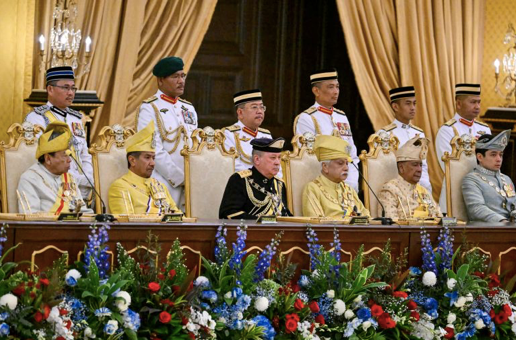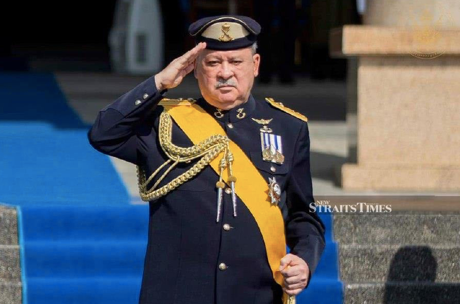Asia Thinkers profiles Sultan Ibrahim Iskandar, Sultan of Johor and the 17th Malaysian King. We look at the changing role of the monarchy in Malaysia and the challenges to ensure unity in the country, while maintaining a stable Government.
Sultan Ibrahim Iskandar was recently appointed Malaysia’s 17th Monarch and will serve a five-year term, which began on 31st January 2024. He is a constitutional monarch who under the constitution plays a largely ceremonial role, acting as the head of state and commander of the armed forces. All laws, Cabinet appointments and the dissolution of Parliament for general elections, require his assent. He retains the power to proclaim an emergency and pardon criminals, while the administrative and governing power is vested in the Prime minister and Parliament. The political influence of the monarchy and the readiness to apply the powers inherent in the position has noticeably grown in recent years and has gained momentum with the appointment of the Sultan of Johor as Monarch. The upheaval that followed the historic election in 2018, when the once-dominant United Malays National Organization (UMNO) was defeated for the first time since independence, has resulted in the monarchy playing a more prominent role in the country’s politics. Sultan Iskandar’s predecessor, Sultan Abdullah, exercised his powers three times to resolve political uncertainty during his reign, twice after governments collapsed and the latest in 2022, when he appointed Anwar Ibrahim as Prime Minister, following an election that ended in a hung parliament.
Sultan Iskandar ascended to the throne of Johor in 2010 and political observers agree that from the beginning he took a hands-on approach to governance and demonstrated he was a supporter of the people, actively engaging in charitable activities and public welfare projects. He also focused his efforts on State infrastructure development, managing to attract considerable foreign investments for housing developments and key projects such as the Johor Economic Growth Corridor and construction of the Johor Bahru-Singapore Rapid Transit System, as well as agreement on the Johor-Singapore Special Economic Zone. This ignited closer co-operation between Malaysia and Singapore. His profile includes a strong educational background, military experience and significant Malaysian business investments, especially in Johor, making him one of Malaysia’s wealthiest investors. Asrul Hadi, a Malaysian Political analyst, told Al Jazeera, in referring to the Sultans leadership of the Johor state government, “Unlike other state rulers who have been mostly ceremonial, the Sultan has always had a hands-on approach to state matters and a working relationship with the chief minister.”
He is expecting a similar relationship with the federal government but there will likely be pushback from the administration, especially on policy matters. He has a reputation for getting things done and working in the best interests of his subjects. Sultan Ibrahim had already triggered controversy prior to his appointment in an interview with Singapore’s Straits Times newspaper, that was published in December 2023.
Under a story headlined “No ‘puppet king’”, the Sultan said there was a need to tackle corruption, for “checks and balances” on the government and to control the “machinations of self-serving politicians”, in a swipe at the political manoeuvring that has rocked the country over the past few years. The new king will not be shy about offering his views to Anwar Ibrahim if he is unhappy.”
Providing leadership in challenging times
Sultan Iskandar has stated his intention to play a more active role in Malaysian affairs, to ensure unity in the country and preserve a stable Government, which he has publicly said are amongst his biggest challenges. Following his appointment, political observers agree that Malaysian politics has begun to stabilise, with Prime Minister Anwar Ibrahim at the head of a unity government. The two men so far appear to have a close working relationship and share similar concerns, notably over the need to tackle corruption and boost the economy and investment.
Maintaining Malaysian unity
Malaysia’s royal houses remain important symbols of identity for many Malays and Sultans are the guardians of Islam in their own states. Sultan Iskandar has previously spoken out against the “Arabisation” of Malay culture and stressed the need for moderation in a country where there are large populations of ethnic Chinese and Indians, most of whom are not Muslim. The Sultan has also condemned racial politics and is famous for ordering the Johor religious authority not to cooperate with “Jakim”, the federal Islamic body. In an interview with The Straits Times in 2023, Sultan Ibrahim said he planned to use his influence to “make things right”, with political stability a priority and corrupt politicians in his crosshairs.

Early in his reign he played a unifying role and brought to an end the controversy regarding socks, sold by KK Supermarkets bearing the word “Allah”. The issue had resulted in bomb attacks on two KK Super Mart outlets. Politicians had been reluctant to act to avoid losing Malay support and failed to see the wider context of the country’s unity and stability. In the absence of leadership, the King intervened. The King’s advice was simple: Maintain religious harmony and reduce polemics, as well as preserve the sanctity of Islam. He also cautioned political leaders from engaging in extreme rhetoric when discussing religious and racial matters.
The King has also continued to build Malaysia’s bilateral relations with foreign countries through soft diplomacy, given his strong personal friendship with international world leaders. This has included fostering closer ties with Singapore and maintaining a personal rapport with top Singaporean leaders, while also reaching out to other ASEAN countries such as Indonesia and Brunei.
Fight against corruption
The king has made the fight against corruption one of his key areas of concern, with Malaysia having a history of corruption among Civil servants, politicians, and business investors, to a point where most Malaysians feel it has become institutionalised in both government and private sectors. In September the Malaysian Anticorruption Agency (MACC) arrested 34 Customs officers assigned to KL International Airport Cargo in connection with smuggling activities that are believed to have resulted in leakage of RM2billion of the country’s revenue over the past two years. Around the same time, a senior policeman was arrested for alleged bribery, having more than RM1.2million found in several locations. The Credit for empowering the Malaysian Anti-Corruption Commission (MACC) which previously had minimal government support, goes to the Prime Minister and the King, who have made the fight against corruption one of their top priorities. The King has made sure he is well informed and holds regular meetings with the Prime Minister and MACC on corruption issues. He has even suggested that MACC should report directly to him.
Comments from Malaysian Netizens and the Media
The Malaysian media in general are in agreement that the King’s actions have been popular with the public and they do not disagree with him on the need to tackle corruption and ensure political stability. Journalists also agree that the weakness of the Malaysian Government with a coalition struggling to hold itself together, has created a political void. Malaysians are increasingly looking for authoritative figures for leadership as an economic downturn affects standards of living.
Asia Thinkers polled Malaysian Netizens to get their views on Sultan Iskandar intention to take on a leadership role and become involved in politics and key issues affecting the country. There were concerns from Netizens about his wealth, potential conflicts of interest and his outspoken nature, which could create tension with the Government over the balance of power between the monarchy and government. However, many also saw him as a stabilising influence and a check to the current political instability. Malaysians were aware that Sultan Iskandar wouldn’t be just a mere ceremonial figure but would, if necessary, provide real leadership and are generally supportive of him.
Overall Malaysian netizens wanted to see a better economy and a stronger Government providing leadership to the country. Others commented that the previous situation when the country couldn’t form a government, created a lot of uncertainty and saw an increase in Malay nationalism, which frightened the Indian and Chinese communities. The majority viewed the King’s first 100 days as positive due to his approachable demeanour, commitment to social issues, and efforts to promote unity among Malaysia’s diverse population. His focus on humanitarian causes and public welfare also garnered respect, with an overall confidence that with his strong leadership, things will get better. His no-nonsense approach was also applauded by the business community, who believe overseas investor confidence is improving.
A KL taxi driver commenting on the Sultans current role said, “It is the best thing that can happen. All we want is a strong government supported by a strong Monarch, if that is what is required for our families to get work and have a peaceful life.”
The role of the monarch in Malaysia has been evolving since independence. The king under the constitution is a symbolic head of State but has more recently become accepted as crucial in providing leadership in times of crisis. The result has been that Malaysians are increasingly looking to the Sultan to take a greater leadership role to ensure economic and political stability.
Disclaimer: The opinions expressed in this article are soley those of the writer. The author assumes no responsibility or liability for any errors or omissions in the content of this article. The information contained in this article is provided on an “as is” basis with no guarantees of completeness, accuracy, usefulness or timeliness.

